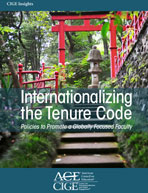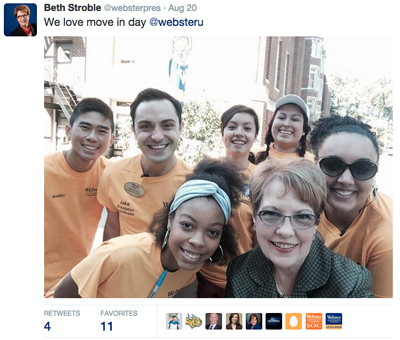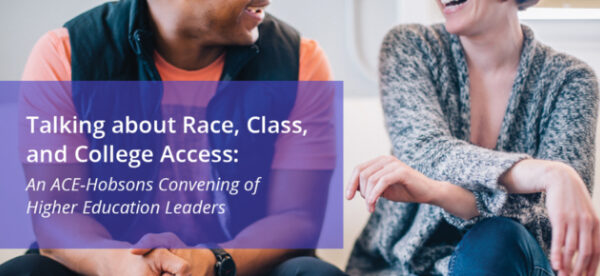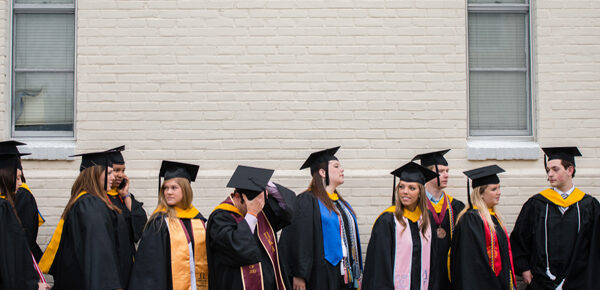Topic:

The Other 90 Percent: Global Competence for All
In the increasingly globalized world of the 21st century, colleges and universities are recognizing the need to provide students with the knowledge and skills needed to live and work across borders. The big problem, however, is that in the United States, few students ever have this type of experience. Robin Helms looks at the options to give students international experiences beyond study abroad.
November 16, 2015
SDSU and Rio Salado College Empowering Student Veterans to Succeed, On and Off Campus
In commemoration of Veterans Day, we wanted to share with you two ACE member institutions that have initiated innovative programs and services for student veterans: San Diego State University and Rio Salado College in Arizona.
November 10, 2015
McDaniel College Scholarship Program Aims for Diverse Workforce
Workforce diversity and postsecondary access are both key to creating a more creative and productive workforce. That’s why McDaniel College is partnering with the Howard County Public School System to create Teachers for Tomorrow, a scholarship program aimed at increasing higher education access and affordability for low-income students and developing a more diverse workforce in Howard County.
November 4, 2015
CUNY to Bolster Community College Graduation Rates
The City University of New York has announced a groundbreaking partnership with New York City to significantly increase graduation rates at its community colleges. CUNY will scale-up its already successful Accelerated Study in Associate Programs, with plans to grow the program from 4,000 to 25,000 students over the next three years and raise the graduation rate to 34 percent by 2025.
October 21, 2015
Reimagining Remediation in Tennessee
With implementation of the Tennessee Promise, higher education is looking to Tennessee for lessons learned during its foray into the world of free community college. The Tennessee Board of Regents (TBR) is no less a stranger to scrutiny for its innovative practices in developmental education. Tristan Denley discusses TBR’s pioneering approach to remediation.
October 21, 2015

Webster President Beth Stroble on College Leaders Who Tweet
The term “social media” has entered that rare stratosphere of fame and recognition normally reserved for rock stars and presidents. Now, rock stars and presidents bow to the power of social media. Webster President Beth Stroble, an enthusiastic early adopter when it comes to communication technologies, reflects on what this means for higher education.
October 19, 2015

Talking About Race, Class and College Access
Issues of equitable access and changing demographics weigh heavy on the shoulders of American higher education – and rightly so, write ACE’s Lorelle Espinosa and Matthew Gaertner of Pearson’s Center for College & Career Success. In this post, Espinosa and Gaertner discuss the takeaways from a recent convening on college access and success for minority and low-income students.
October 5, 2015
New CSUSM Center Helps Latinos Overcome Academic Obstacles
At California State University San Marcos (CSUSM), nearly 40 percent of the student body identifies as Latino. Unfortunately, many first-generation Latino students face major hurdles to pursuing a post-secondary education. And when they do enroll, they often find the transition challenging—which is why CSUSM launched The Latin@ Center earlier this month.
September 30, 2015
#HBCUWeek: North Carolina A&T Goes the Distance With Distance Learning
As the higher education community celebrates HBCU Week, North Carolina Agricultural and Technical State University is among the ACE member institutions in the news for promoting education excellence and innovation. A&T is already the nation’s largest HBCU, but it is now working to increase its enrollment even further by expanding and emphasizing distance education.
September 23, 2015

Supporting First-Generation and Low-Income Students at the University of Florida
First launched in 2006, the Machen Florida Opportunity Scholars Program supports nearly 1,250 undergraduates annually and will soon surpass the 2,000 alumni milestone. For the first-generation and low-income students in the program, early estimates indicate that they are 44 percent more likely to graduate in four years and 47 percent more likely to complete in six years compared to their peers.
September 21, 2015